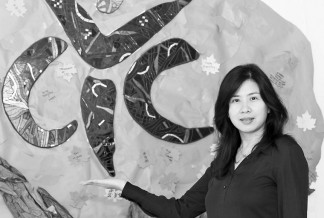
(Sophia Truong 三藩市)
「你好!」有人大叫。
啪啦!
一輛汽車從我身邊飛馳而過,伴隨著一個男人的狂笑聲和汽車引擎加速的轟鳴聲。我往後退,眼睛在迅速消失的車輛和我腳邊的黑色小塑料袋之間打轉,袋子裡的東西砸在粗糙的水泥地上的聲音仍然在我耳邊回響。
我的心跳砰砰作響。一、二、三。
我吸氣。我的拳頭握緊了。
「仁」,我想著,「守仁」。
朋友莎拉抓住了我的胳膊。
「你還好嗎?」她低聲說,臉上帶著震驚和柔弱,「聽起來像玻璃。那個人…他們開車經過…他們扔的東西…它…它聽起來像玻璃。」
我再次吸氣。
「仁」。
很難用通俗的英語來定義這個儒家美德。寫在紙上時,這個字是將「人」字和「二」字結合起來,字面意思象徵著「兩個人之間的關係」或「愛他人的行為」。
我發現,谷歌翻譯將這種美德簡單地概括為「人性化」、「仁愛」或「同情」。
我小時候經常聽到這個詞,坐在餐桌旁,看著我的公公(外公)在廚房裡忙來忙去。吃著一碗碗熱騰騰的白米飯和一盤盤塗滿豆豉醬的魚,我的公公會給我講他的童年,講他在廣東貧困的台山家鄉,那裡的天氣從來都是悶熱的,泥鰍是直接用手從河裡抓來的,當天晚餐就可以吃了。
那裡有土路和土房,還有一個主廣場,廣場上有一棵比村子本身還要古老的樹。每天早上,村民們都會被一頭驕傲的紅冠公雞盡責地叫醒。
「但我離開了中國,來美國」,我的公公總是會說,然後從蹩腳的英語轉到他的母語台山方言。「我作為一個紙兒子來到這裡。我生活在貧困之中。不得不學習如何實踐『仁』的美德」。
當一個人來到美國,因被懷疑持有假證件而被關押在移民中心時,他在踐行人性化。
當一個人在沒有任何事先指導的情況下被迫學習英語,並因口音過重而被永遠嘲笑時,他在踐行同情。當一個人活在假姓氏下,因為害怕因假護照移民美國而被遣返台山的貧窮村莊時,他在踐行仁愛。
一個人一輩子在踐行「仁」,直到有一天他死了,被埋在美國的土地上,與台山深處貧窮的土村子隔著一片海洋。
我長出一口氣。
「仁」。
我轉向莎拉。
我打量著她棕色的眼睛,黑色的長髮,柔軟圓潤的臉頰幾乎撐不住她的藍框眼鏡。我注意到她鼻子的寬度,嘴的形狀,下巴曲線上的小痣。
我看著她明顯的東亞人特徵。
她回過頭來看著我,然後抬起頭,再低下頭,她的棕色眼睛快速轉動,目光在空蕩蕩的街道上掃來掃去,不安地尋找著甚麼。某個人,任何人。
「救命」,她的臉似乎在懇求,「救救我。我很害怕」。
但這裡只有我。
只有我們。只有兩個華裔小女孩,站在一個荒涼的街角,從一場未遂的仇恨襲擊的餘波中掙紮出來。
「我很好」,我告訴莎拉,「我很好,我很好,我很好。你很好。我們都很好。」
當一個人被人從飛馳的車窗拋物,被人用中文「你好」嘲笑亞裔血統,而他所做的不過是和一個好朋友走在大街上,他要踐行「愛他人」。
人要踐行同情,即使面對震驚、憤怒、暴怒,以及有錯必罰的需求。
人要踐行「仁」,即仁慈的美德和愛他人的行為,即使他人沒有「仁」。
「我們不要有憤怒的想法」,我給莎拉一個小小的、無奈的微笑,「已經過去了。我們還是繼續走吧。」
【英文組一等獎,本報翻譯為中文以饗讀者,英文原稿如下】
The Act of Loving Others
“Ni hao!” Someone yells.
Smash!
A car speeds past me, carrying with it the sound of a man’s rancorous laughter and the rumble of an engine being harshly reved. I flinch back, looking between the rapidly disappearing vehicle and the small, lumpy black plastic bag sitting near my feet, the sound of its contents smashing onto the harsh concrete still ringing in my ears.
My heartbeat thumps. One, two, three.
I inhale. My fists clench.
‘Ren,’ I think. ‘Have ren.’
My friend Sarah grabs my arm.
“Are you okay ” She whispers, face shocked and subdued.“That sounded like glass. That person-when they drove by-the thing they threw, it-it sounded like glass.”
I inhale again.
‘Ren.’
It is difficult to define the Confuscian virtue in layman’s English. When written on paper in the form of a single character, the word combines the character of “man” (人) with that of “two” (二) to symbolize the literal concept of “a relationship between two people,” or the “the act of loving others,” (仁).
Google translate, I’ve discovered, summarizes the virtue as simply “humaneness,” “benevolence,” or “empathy.”
I used to hear this word often as a little girl, sitting down at the dinner table next to my Gong Gong as my Poi Poi bustled around our kitchen. Over bowls of warm white rice and trays of fish slathered with black bean sauce, my Gong Gong would tell me tales of his childhood, of his home village in the poor Taishan region of Guangdong, where the weather never ceased to be anything less than sweltering, and mudfish was caught straight by hand from the river and eaten for supper that very day. There were dirt roads and dirt houses and a main square that held a tree older than the village itself, and every morning the villagers would be awoken by the dutiful cry of a proud, red-crested rooster.
“But I left China. Come to America.” My Gong Gong would always say, before switching from broken English to his native Taishanese dialect. “I came here as a paper son. I lived in poverty. And I had to learn how to practice the virtue ren.”
One practices humaneness, when one comes to America and is held captive at an immigration center on suspicions of having false papers. One practices empathy, when one is forced to learn English without any prior teaching, and is forever mocked for having a thick accent. One practices benevolence, when one lives under a false surname, for fear of being deported back to a poor village in Taishan for immigrating to America with the use of a fake passport.
One practices ren until the day one dies, and is buried on American soil, an ocean from a poor dirt village in the depths of Taishan.
I exhale.
‘Ren.’
I turn to Sarah.
I take in her brown eyes, her long black hair, the blue framed glasses perched precariously above her soft, rounded cheeks. I take in the width of her nose, the shape of her mouth, the little mole around the curve of her jaw.
I take in her distinctly East Asian features.
She looks back at me, then up, then down, her brown eyes darting rapidly, gaze scanning the empty street in wide, restless movements, searching and scanning for something. Someone. Anyone.
‘Help,’ her face seems to plead, ‘Help me. I’m scared.’
But there’s just me.
There’s just us. There’s just two little Chinese girls, standing on a desolate street corner, reeling from the aftermath of an attempted hate attack.
“I’m okay.” I tell Sarah. “I’m okay, I’m okay, I’m okay. You’re okay. We’re both okay.”
One practices the act of loving others, when one has something thrown at them from the window of a speeding car, and yelled at with the hostile use of the Chinese word for “Hello” as a way to mock their Asian heritage, when all one has done is merely walk down a street with a good friend.
One practices empathy, even in the face of shock and anger and rage and a need for a wrong to not go unpunished.
One practices ren, the virtue of benevolence and the act of loving others, even when others do not have ren themselves.
“Let’s not think angry thoughts.” I give Sarah a small, wry smile. “It’s done. Let’s just keep walking.”
**
Essay language: English (with the use of Chinese pinyin/words)
– Gong Gong = Maternal Grandfather
– Poi Poi = Maternal Grandmother
– Ren = Confucian virtue that describes the act of showing benevolence towards others.
Sophia Truong, San Francisco









